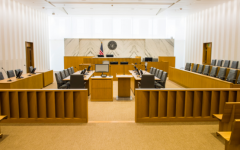
Judicial Officers and Holidays in California
If a judicial holiday falls on a Saturday or a Sunday, the Judicial Council may designate an alternative day for observance of the holiday
By Chris Micheli, January 17, 2025 2:30 am
California’s Code of Civil Procedure contains provisions related to judicial officers and judicial holidays. Part 1, Title 2, Chapter 5 contains miscellaneous provisions respecting courts of justice in this state. Section 182 provides that the heading to this chapter is not to be deemed to govern or limit the scope or meaning of this chapter.
Section 184 states that no proceeding in any court of justice, in an action or special proceeding pending, is affected by a vacancy in the office of all or any of the judges or justices.
Section 185 specifies that every written proceeding in a court of justice in this state must be in the English language, and judicial proceedings are to be conducted, preserved, and published in no other. Nothing in this section prohibits a court from providing an unofficial translation of a court order in a language other than English.
Section 186 says that the abbreviations that as are in common use may be used, and numbers may be expressed by figures or numerals in the customary manner.
Section 187 states that, when jurisdiction is conferred on a Court or judicial officer, all the means necessary to carry it into effect are also given; and, in the exercise of this jurisdiction, if the course of proceeding is not specifically pointed out by a statute, any suitable process or mode of proceeding may be adopted which may appear most conformable to the spirit of this Code.
Part 1, Title 1, Chapter 6, Article 3, deals with judicial holidays. Section 133 allows courts of justice to be held and judicial business transacted on any day, except as provided in this article.
Section 134 provides that the courts are required to be closed for the transaction of judicial business on judicial holidays for all but (1) to give, upon their request, instructions to a jury when deliberating on their verdict; (2) to receive a verdict or discharge a jury; (3) for the conduct of arraignments and the exercise of the powers of a magistrate in a criminal action, or in a proceeding of a criminal nature; and, (4) for the conduct of Saturday small claims court sessions.
In addition, injunctions and writs of prohibition may be issued and served on any day. In any superior court, one or more departments of the court may remain open and in session for the transaction of any business that may come before the department in the exercise of the civil or criminal jurisdiction of the court, or both, on a judicial holiday or at any hours of the day or night, or both, as the judges of the court prescribe.
Section 135 states that every full day designated as a holiday by Section 6700 of the Government Code is a judicial holiday, except “Lunar New Year,” April 24, known as “Genocide Remembrance Day,” September 9, known as “Admission Day,” the second Monday in October, known as “Columbus Day,” and any other day appointed by the President, but not by the Governor, for a public fast, thanksgiving, or holiday.
In addition, if a judicial holiday falls on a Saturday or a Sunday, the Judicial Council may designate an alternative day for observance of the holiday. Every Saturday and the day after Thanksgiving Day are judicial holidays. Officers and employees of the courts observe only the judicial holidays established pursuant to this section.
Section 136 provides that, if a day appointed for the holding or sitting of a court, or to which it is adjourned, falls on a judicial holiday, it is deemed appointed for or adjourned to the next day.
- Designating ‘Spot’ Bills in the California Legislature - March 2, 2026
- Regulatory Powers of the Fish and Game Commission - March 2, 2026
- Committee Versus Floor Lobbying - March 1, 2026




